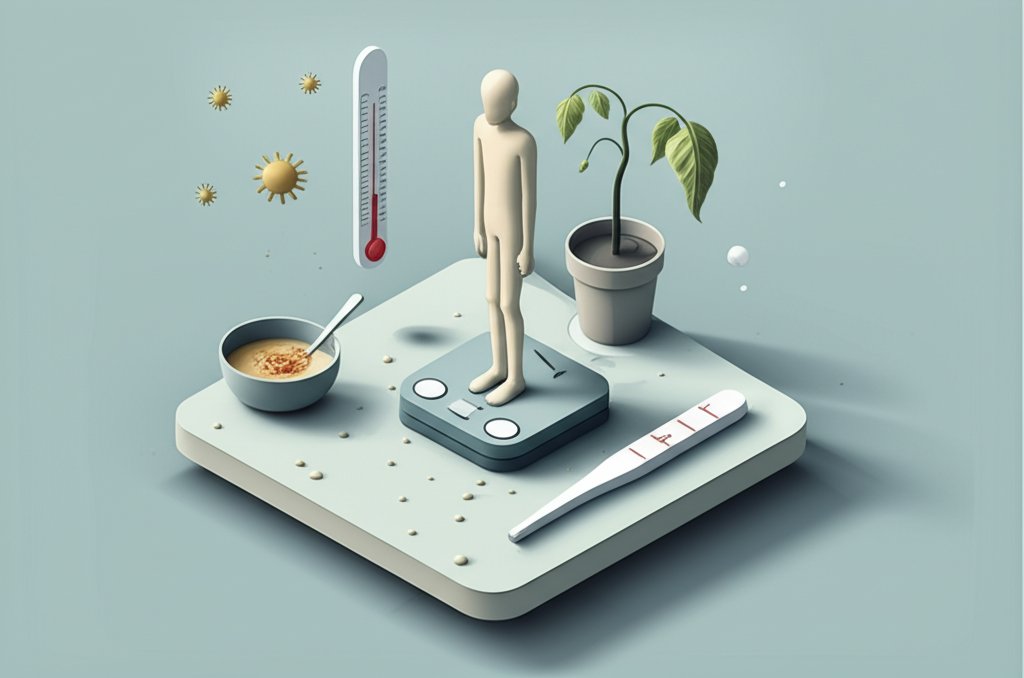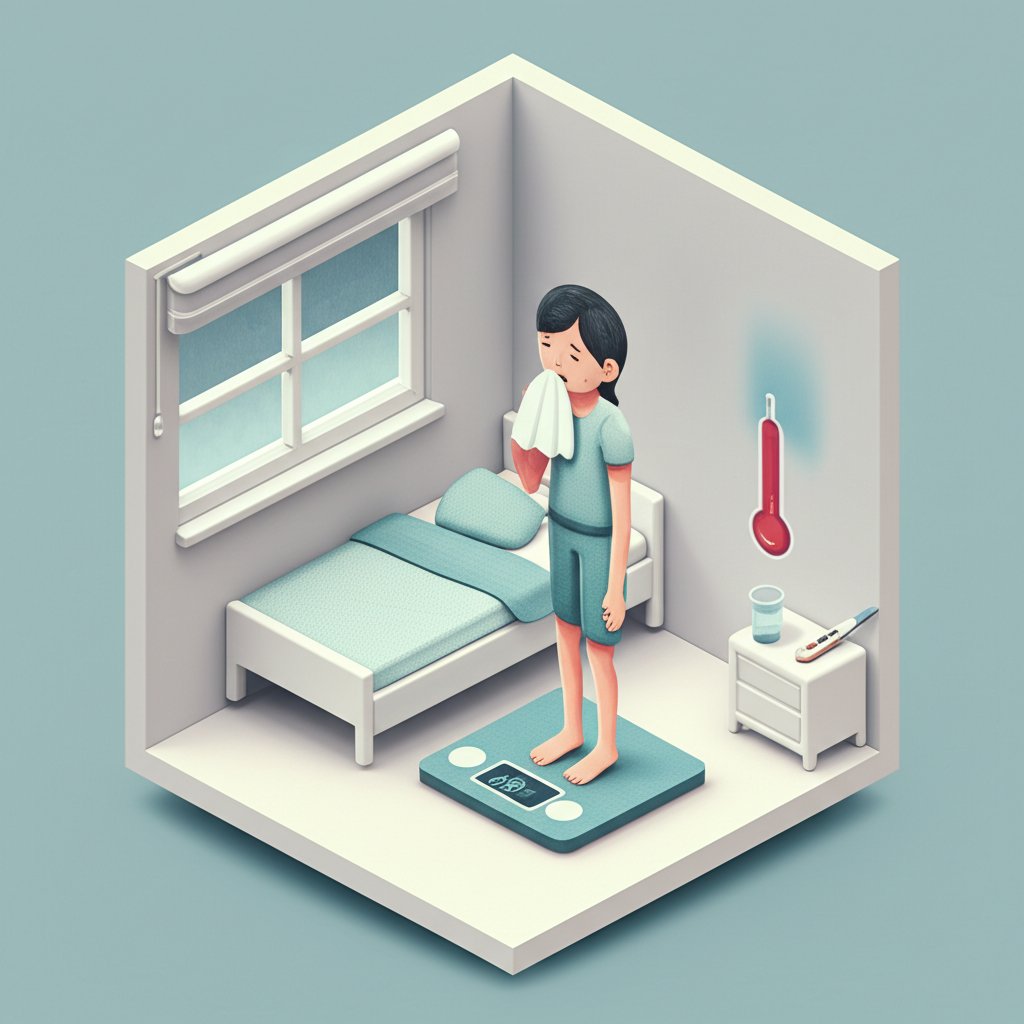Of course. Here is the comprehensive pillar article, written in the requested style and format.
You’ve spent the last four days under a mountain of blankets, surviving on tea and broth. The fever finally breaks, the fog in your head starts to clear, and you feel… lighter. Cautiously, you step on the scale and see the number has dropped a few pounds. It’s a common experience after a bout of the flu, a stomach bug, or another illness, but it begs the question: why do you lose weight when sick?
It’s not just your imagination. The drop on the scale is real, but it’s the result of a complex internal battle. When your body is fighting off an invader, it shifts into a full-blown emergency response mode, rerouting energy, burning fuel differently, and sending your normal routines—like eating—to the back burner.
This guide breaks down the science behind why this happens, what that weight loss actually consists of, and how to properly refuel your body for a swift recovery.
At a Glance: The 4 Main Reasons You Shed Pounds When Ill
For those who want the quick takeaway, here’s the short version. Sickness-related weight loss is typically a combination of four key factors:
- Your Metabolism Speeds Up: Your body burns more calories than usual as your immune system works overtime and your temperature rises to fight the infection.
- Your Appetite Vanishes: Chemical signals in your brain, combined with symptoms like nausea or a sore throat, suppress your desire to eat, leading to a significant calorie deficit.
- You Lose Water Weight: Dehydration from fever, sweating, vomiting, or diarrhea causes a rapid but temporary drop in weight.
- Your Body Taps into Muscle: During prolonged or severe illness, your body may break down muscle tissue for energy when other fuel sources are scarce.
Your Body’s Calorie Furnace Goes into Overdrive
When you’re healthy, your body runs like a well-managed city, with energy efficiently allocated to daily tasks. When you get sick, that city goes on lockdown and activates its emergency response team: your immune system. This response is incredibly energy-intensive.
Think of it as your body turning up its internal thermostat. This process is driven by two main forces.
The Fever Factor: Burning Fuel to Raise the Heat
A fever isn’t just a symptom; it’s a weapon. Your body intentionally raises its core temperature to create an inhospitable environment for viruses and bacteria. But generating that heat requires a tremendous amount of metabolic energy.
For every degree Celsius your temperature rises, your basal metabolic rate (BMR)—the number of calories you burn at rest—can increase by as much as 10-13%. A mild fever of 100.4°F (38°C) is enough to have your body burning through calories significantly faster than it would if you were just resting in bed at a normal temperature. Your body is essentially doing the caloric equivalent of a light workout, all while you’re lying still.
The Role of Stress Hormones
Being sick is a major stressor on your body. In response, your adrenal glands release stress hormones like cortisol. While chronically high cortisol can lead to weight gain, a short-term spike during an illness has the opposite effect. It helps mobilize your energy stores—releasing glucose and fatty acids into the bloodstream—so your immune cells have the fuel they need to fight. This hormonal surge contributes to the accelerated calorie burn, further widening the gap between energy used and energy consumed.
Why Your Appetite Takes a Nosedive
It’s one of the cruel ironies of being sick: your body desperately needs fuel, but the last thing you want to do is eat. This isn’t a failure of willpower; it’s a calculated biological strategy.
Your Brain’s Hunger Signals Get Rerouted
The primary culprit behind your lost appetite is a class of proteins called cytokines. Think of cytokines as the emergency dispatchers for your immune system. When they detect an infection, they send out a flood of signals that tell your body to prioritize fighting it above all else—including digestion and hunger.
These signals travel to the hypothalamus, the part of your brain that acts as your body’s control center for hunger, thirst, and body temperature. The cytokines essentially tell the hypothalamus, “Hold all non-essential messages. We have an emergency.” As a result, your typical hunger cues are silenced. This is your body’s way of conserving energy, redirecting it away from the complex process of digestion and toward the immediate threat.
When Food Itself Becomes the Enemy
Beyond the brain chemistry, the physical symptoms of illness make eating a chore.
- Nausea and Vomiting: A stomach bug makes the mere thought of food repulsive.
- Sore Throat: Swallowing can feel like sandpaper, making even soft foods a challenge.
- Loss of Smell and Taste: When you can’t taste or smell your food, the pleasure and motivation to eat disappear. This is a hallmark of many respiratory viruses.
- General Malaise: The overwhelming fatigue and body aches that accompany sickness simply sap any energy or desire you might have had for preparing and eating a meal.
This combination of suppressed hunger signals and physical barriers to eating is a powerful one-two punch that makes a calorie deficit almost inevitable.
The Dehydration Deception: Is It “Real” Weight Loss?

You were sick for three days, ate almost nothing, and the scale says you’re down five pounds. Did you really lose five pounds of fat? Almost certainly not. A large portion of that initial, rapid weight loss is water.
The human body is about 60% water. It doesn’t take much fluid loss to see a noticeable change on the scale. When you’re sick, you lose fluids at an accelerated rate through multiple channels:
- Sweating: A fever is your body’s attempt to cool itself, and that means sweating, sometimes profusely, even under blankets.
- Vomiting and Diarrhea: These symptoms are designed to expel pathogens, but they also flush out huge amounts of water and electrolytes.
- Increased Respiration: You breathe faster when you have a fever, and you lose a small amount of water vapor with every exhale.
Because a gallon of water weighs about 8.3 pounds, losing just a few cups of fluid can register as a pound or two of weight loss. This is why hydration is so critical during illness. The weight you lose from dehydration isn’t fat or muscle; it’s “water weight,” and it will come back as soon as you properly rehydrate. This rapid drop is a key reason Why illness causes weight loss so suddenly.
The Unwanted Sacrifice: When Your Body Burns Muscle
If an illness is severe or drags on for more than a few days, and your calorie intake remains extremely low, your body exhausts its readily available energy stores (glycogen). Once that’s gone, it turns to fat reserves. But it also initiates a process called catabolism, where it begins to break down its own tissue for fuel.
Unfortunately, muscle tissue is a prime target.
Through a process called gluconeogenesis, your body can convert the amino acids from your muscle protein into the glucose your brain and immune cells need to function. It’s a survival mechanism—a last-ditch effort to create fuel when none is coming in.
Compounding this is the fact that you’re likely bedridden. Lack of physical activity leads to muscle atrophy, where muscle fibers shrink from disuse. The combination of your body actively breaking down muscle for energy and the lack of use-it-or-lose-it stimulation means you can lose a surprising amount of lean mass during a tough illness. This is one of the most detrimental aspects of Weight loss during illness, as regaining muscle is much harder than regaining fat or water weight.
A Practical Guide to Eating and Drinking When You’re Sick

Your focus during illness should never be on weight management, but on recovery. The goal is to give your body the resources it needs to win the fight. Here’s how to approach it.
Rule #1: Hydration Is Non-Negotiable
Before you even think about food, focus on fluids. Dehydration can worsen every symptom, from headaches and fatigue to body aches.
- What to Drink: Water is always a great choice. Other excellent options include clear broths (like chicken or vegetable), herbal teas with a bit of honey, and electrolyte drinks or diluted fruit juice to help replenish lost minerals.
- How Much: Don’t try to chug a huge glass at once, especially if you’re nauseous. Take small, frequent sips throughout the day. A good rule of thumb is to drink enough so that your urine is a pale, light-yellow color.
Choosing Foods That Heal, Not Hinder
When your appetite starts to return, ease back into eating with foods that are easy to digest and packed with nutrients.
- The BRAT Diet: This classic approach—Bananas, Rice, Applesauce, and Toast—is recommended for a reason. These bland, low-fiber foods are gentle on the digestive system, making them ideal after a stomach bug.
- Protein is Your Priority: To combat muscle loss, try to incorporate easily digestible protein as soon as you can tolerate it. Good sources include scrambled eggs, Greek yogurt, chicken soup, or a simple protein smoothie.
- Don’t Fear Carbs: Your body needs energy. Simple carbohydrates from toast, crackers, potatoes, or rice provide quick, easily accessible fuel for your immune cells.
- The Power of Chicken Soup: It’s not just an old wives’ tale. Studies have shown that chicken soup has mild anti-inflammatory properties. The warm broth helps with hydration and can soothe a sore throat, while the steam can help clear nasal passages.
The “Little and Often” Strategy
A large meal can overwhelm a sensitive digestive system and feel intimidating when you have no appetite. Instead, aim for six to eight very small “mini-meals” or snacks throughout the day. A few crackers, a half a banana, a small bowl of yogurt—these are less daunting and provide a steady stream of energy.
A Note on Medications
If you take any prescription medications, including popular weight-loss drugs like semaglutide (Ozempic, Wegovy) or tirzepatide (Mounjaro, Zepbound), talk to your doctor before taking any over-the-counter cold or flu remedies. Interactions can occur, and your doctor may need to adjust your prescription dosage while you’re sick, especially if you’re not eating.
Common Questions About Sickness and Weight Loss
Let’s address a few common concerns that pop up when the scale drops post-illness.
How much weight loss is normal when sick?
Losing 2 to 5 pounds during a typical week-long illness like the flu is common. For a more severe stomach bug with significant fluid loss, you might see a drop of up to 10 pounds, but most of this will be water weight. If you experience drastic, unexplained weight loss without being sick, it’s crucial to see a doctor.
How quickly will I gain the weight back?
The water weight often comes back within a few days of rehydrating properly. Fat and muscle weight will return more slowly as your appetite normalizes and you resume your regular diet and activity levels. It might take a week or two to feel fully back to your baseline.
Should I try to stop the weight loss when I’m sick?
No. Your primary mission is recovery. Forcing yourself to eat when you’re nauseous or have zero appetite can make you feel worse. Instead of focusing on stopping weight loss, shift your focus to staying hydrated and getting in small amounts of nutrient-dense food when you can. The weight will sort itself out once you’re healthy.
What about exercising when I’m sick?
Avoid strenuous exercise. Your body is already under immense stress fighting the infection, and a hard workout will only divert resources from your immune system and potentially prolong your illness. Gentle movement, like a short, slow walk once you’re feeling better, can be beneficial, but listen to your body and prioritize rest above all else.
Shifting Your Focus from the Scale to Recovery
Seeing the number on the scale go down might feel like a silver lining, but it’s important to frame it correctly. The weight you lose when you’re sick isn’t the result of a healthy process; it’s a sign that your body is in a state of high alert, burning through its resources to get you well.
Instead of tracking your weight, track your recovery. Are you drinking enough fluids? Can you manage a small snack? Are you getting the deep, restorative rest your body needs? These are the metrics that truly matter.
Your post-illness recovery plan is simple:
- Rehydrate Relentlessly: Make fluids your top priority.
- Eat Gently and Smartly: Start with bland, easy-to-digest foods and slowly reintroduce protein and more complex meals as your appetite returns.
- Rest Without Guilt: Your body heals during rest. Give it as much as it needs.
- Ease Back into Activity: Don’t jump straight back into your intense workout routine. Start with walking and gradually increase the intensity over a week or two.
Once you’re back on your feet and feeling strong again, your weight will naturally stabilize. The brief drop on the scale is just a footnote in the story of your body’s incredible ability to fight, repair, and recover.
- Divided Food Storage Containers Transform Meal Prep and Portion Control - February 8, 2026
- Divided Food Containers Are Meal Preps Secret Weapon - February 7, 2026
- Food Kits for Adults Offer Fun DIY Cooking Adventures - February 6, 2026










